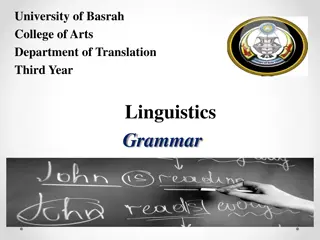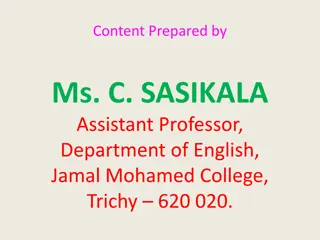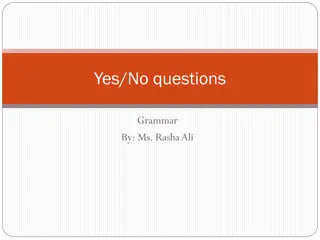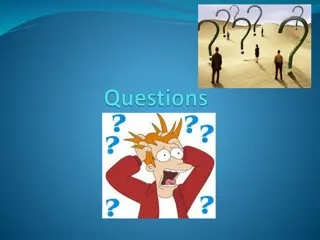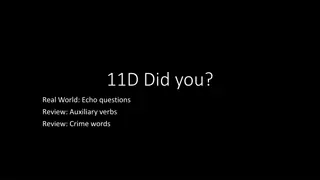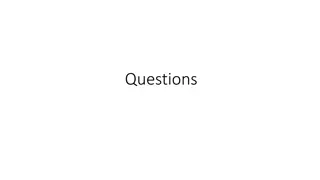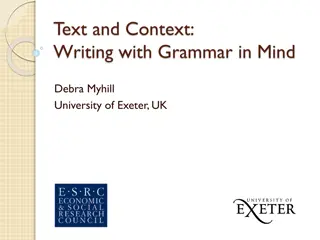Mastering Tag Questions in English Grammar
Learn how to effectively construct and use tag questions in English grammar through four basic rules: ensuring same tense, using negative tags for affirmative sentences and vice versa, always including a pronoun, and using contracted forms of helping verbs in negative tags. Examples provided for better understanding.
Download Presentation

Please find below an Image/Link to download the presentation.
The content on the website is provided AS IS for your information and personal use only. It may not be sold, licensed, or shared on other websites without obtaining consent from the author.If you encounter any issues during the download, it is possible that the publisher has removed the file from their server.
You are allowed to download the files provided on this website for personal or commercial use, subject to the condition that they are used lawfully. All files are the property of their respective owners.
The content on the website is provided AS IS for your information and personal use only. It may not be sold, licensed, or shared on other websites without obtaining consent from the author.
E N D
Presentation Transcript
Welcome to our online class Welcome to our online class How are you? I hope you are well How are you? I hope you are well. .
Intro Rahim Kazi Intro Kazi Md. Md. Abdur Abdur Rahim 01674007664 01674007664 Assistant Head Teacher Mariam Assistant Head Teacher Mariam Nagor Nagor Girls High School. Girls High School.
Look at the picture Look at the picture
TAG A tag question grammatical structure. It refers to declarative statements or an imperatives that are modified to become a question by adding an interrogative fragment. TAG A tag question is a
Four basic rules have to be kept in mind while making question tags- 1 The sentence and the question tag will be in the same tense. 2 If the sentence is an affirmative sentence, the question tag will be negative. If the sentence is a negative sentence the question tag will be positive. 3 The pronoun is always used in the question tag. 4 In negative question tags we use the contracted form of the helping verb and not Eg- Hasn t , couldn t etc.
The contracted form of the helping verb and not The contracted form of the helping verb and not is + not = isn t are + not = aren t was + not = wasn t were + not = weren t have + not = haven t has + not = hasn t had + not = hadn t might + not = mightn t must + not = mustn t need + not = needn t dare + not = daren t ought + not = oughtn t do + not = don t does + not = doesn t did + not = didn t could + not = couldn t Exceptional: am + not = aren t/ain't can + not = can t will + not = won t shall + not = shan t Exceptional:
Rule 01 In affirmative sentence the Tag question will be negative. Examples a. A good student always works hard, doesn t he? b. A teacher goes to school daily, doesn t he? c. Madhu plucks flowers, doesn t she? d. You appeared at the SSC examination, didn t you? e. Helmet makes driving safe, doesn t it? In affirmative sentence the Tag question will be negative.
Rule 02 Rule 02 In Negative Sentence the Tag question will be Positive. Examples a. All the children were not present, were they? b. Everybody cannot be clever, can they? In Negative Sentence the Tag question will be Positive.
Subject Person (male-singular)He Person (female-singular)She Non-person (plural)They Non-person (singular)It Nothing/anything/ Everything, Example Pronouns of question tag Rahim is a good student, isn t he? Rima has gone there, hasn t she? Birds can fly, can t they? The cow lives on grass, doesn t it? Nothing happened yesterday, did it? Everyone has agreed to it, haven t they? something (thing)It No/Every/any/ some Body & one They
No/ Every + Noun neither of/either of/all of + you neither of/ either of/ all of + us neither of/either of/all of + them/ boys Clause Allah The + Adjective One He/she/ they* You We They It He They One Every mother loves her child, don t they Every teacher is qualified, aren t they they? ? they? ? All of you have heard the name, haven t you All of us know it, don t we Neither of the boys will come, will they That he will come is not sure, is it it? Only Allah can help us, can t He The pious are happy, aren t they One should obey one s parents, shouldn t one you? we? they? He? they? one? ?
RULE RULE 3 3 For sentences having modal Auxiliary (can, could, will, would, may, might, must, shall, should, ought to, need, would rather, had better, dare) Tags will be shalln t, shan t, will not, won t , can t etc depending on whetether positive or negative is needed. Examples a. b. A student must c. Everybody cannot d. Everybody should e. Water animals can A healthy body can must be regular in studies, musn t cannot drive, can should wear a seat belt while driving , shouldn t can breathe under water, can t can achieve the impossible, can t can t it? musn t he? can they? shouldn t they? can t they?
RULE RULE 4 4 Everybody, everyone , no one, no body are singular.So we use a singular verb and singular pronoun with them. But in the question tag a plural verb and a plural pronoun will be used. Examples a. Everybody has to pay his own bill, haven t they? b. None of your friends has arrived yet, have they?
RULE RULE 5 5 For Affirmative Imperative sentence we use will you or won t you in the question tag. Examples a. Be assured of all co-operation, will you b. Switch on the cooler, will c. Please, give me the documents ,won t d. Kindly, take a seat, will will you? will you you? won t you you? will you you?
RULE RULE 6 6 For Negative Imperative sentence we use will you as the question tag. Examples a. Don t touch the wire, will you? b. Don t litter here, will you? c. Don t make a noise in the class, will you?
RULE RULE 7 7 For Imperative sentences beginning with let us, when a suggestion or proposal is being made the question tag will be shall Examples a. Let us go for a movie ,shall we? b. Let us help her to complete the work , shall we? c. Let us go to meet her, shall we? shall we we.
RULE RULE 8 8 For Imperative sentences beginning with let but not followed by us , the question tag will be will Examples a. Let Madhu go, will you? b. Let them do their homework, will you? c.Let the labourer go, will you? will you you.
RULE RULE 9 9 For assertive sentences having nothing, anything, everything, something as the subject the question tag will have it as the pronoun. Examples a. Everything has gone bad today, hasn t it? b. Everything is clear, isn t it? c. Nothing can revive this worse situation, can it? d. Nothing comes from nothing, does it?
RULE RULE 10 10 If any sentence has used to in it then the question tag will be didn t Examples a. He used to come here, didn t he? b. He used to play the Casio very well, didn t he? didn t.
RULE RULE 11 11 Never, no, nobody, hardly, seldom, scarcely, few, little, not ,none ,rarely etc. are negative words. So the question tag will not be negative. Examples a. A barking dog seldom b. My son never c. He hardly d. He hardly seldom bites, does it? never stands still, does he? hardly came here, did he? hardly does his duties, does he?
RULE RULE 12 12 In exclamatory sentences the question tag will contain the auxiliary verbs. Examples a. How beautiful the garden is!, isn t it? b. How big the slide is!, isn t it? c. How nicely the bird sings!, doesn t it?
RULE RULE 13 13 Moon, earth, river, motherland, country, ship, train are treated as feminine gender. In the tag question the Pronoun used will be she Examples a) The Titanic was thought to be unsinkable, wasn t she? b) Bangladesh is our motherland, isn t she? she .
RULE RULE 14 14 There is no contracted form of am not. So in question tags aren t Examples a. I am a little late today, aren t I? b. I am confident, aren t I? aren t is used.
RULE RULE 15 15 If the subject of a sentence is there/one/this/ that/these/those then the question tag will contain there/one/it/they etc as the pronoun. Examples a. a. b. One problem, can one There One cannot find a solution to this one? There is a book on the table, isn t there there?
RULE RULE 16 16 Collective nouns are used in singular forms so the question tag will have a singular verb and a singular pronoun. Examples a. The class has selected its monitor, hasn t it? b. The team has played very well, hasn t it? But if the collective noun is not treated as one unit, we use the plural verb and the plural pronoun. Example The team have to arrange for their own shoes , haven t they?






